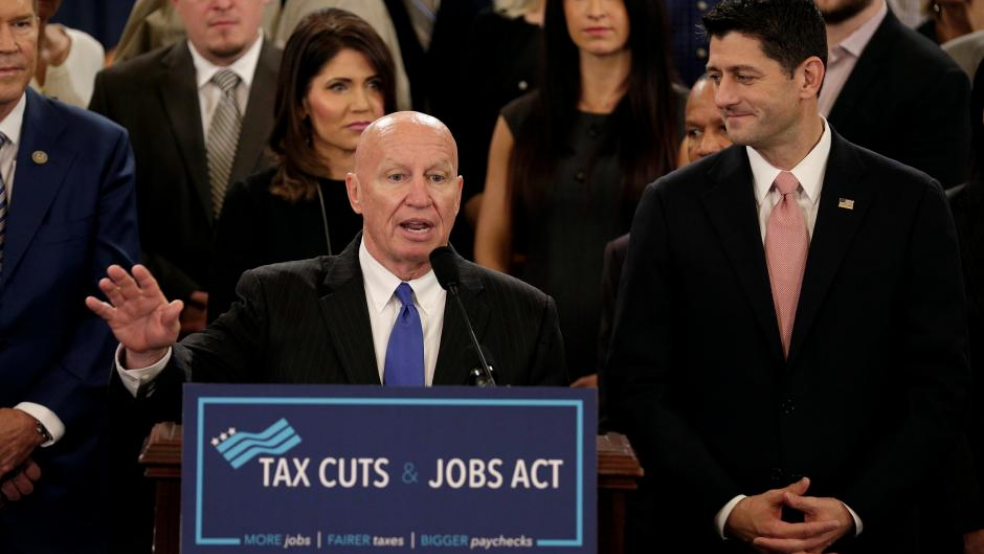With an eye toward November’s midterm elections, House Republicans on Monday unveiled legislation to make permanent the individual tax cuts and pass-through business deductions that were set to expire in 2026 as part of the sweeping tax rewrite enacted late last year.
The three pieces of legislation introduced by the House Ways and Means Committee Monday include:
- The Protecting Family and Small Business Tax Cuts Act of 2018 (H.R. 6760), which would lock in the lower individual rates, larger child tax credit and larger standard deduction from last year’s tax law. The bill would also make permanent the doubling of the estate tax exemption to $22 million per couple and extend deductions that allow certain owners of pass-through businesses to deduct 20 percent of their first $315,000 in earnings.
- The Family Savings Act of 2018 (H.R. 6757), which would allow small businesses to band together to offer 401(k)-type plans, enabling them to distribute administrative costs more broadly and lower fees; eliminate the maximum age restriction on IRA contributions; eliminate the required minimum distributions individuals age 70½ or older with up to $50,000 in cumulative retirement savings must take from their accounts; allow individuals to put up to $2,500 a year of after-tax money into a new "universal savings account" that they could then use for a range of purposes, without the same restrictions on withdrawals as existing retirement accounts; allow workers to use up to $7,500 from retirement savings accounts to cover childbirth or adoption expenses without penalty; and allow tax-free 529 college savings accounts to be used to pay for apprenticeship fees, home schooling and paying off student debt.
- The American Innovation Act of 2018 (H.R. 6756), which allows startup businesses to write off more of their costs, among other provisions.
The deficit effect: Extending the individual tax cuts would increase deficits by about $631 billion through 2029, and the full package would cost about $657 billion. But the longer-term costs will run into the trillions — and that’s on top of the $1.9 trillion cost of the 2017 tax law over the 10 years from 2018 through 2027 projected by the Congressional Budget Office. The Committee for a Responsible Federal Budget estimates that the legislation would cost $4 trillion over the next 20 years, or $5 trillion with interest.
Why it matters: House Republicans may pass the package this month, but the legislation has little chance of getting through the Senate, where it would need Democratic votes. Even some Republicans, especially those in high-tax states where residents may be hurt by an extension of the limits on deducting state and local taxes, are reportedly worried about voting for the package. So this is all about setting up political messaging at this point — and even there, it’s not clear how much Republicans stand to gain, given that the first round of tax cuts hasn’t been very popular and the new proposals open GOP lawmakers up to renewed criticism that they’re willing to explode the deficit further to provide tax cuts that largely benefit the wealthiest Americans.
“After handing massive unpaid-for tax breaks to Big Pharma, Wall Street and the wealthiest 1 percent with the first GOP tax scam for the rich, House Republicans are here with more of the same," House Democratic leader Nancy Pelosi said in a statement Monday. “With version 2.0 of the GOP tax scam for the rich, Republicans want to add even more to the deficit, and even more to the bank accounts of the wealthiest 1 percent. Then, Republicans will use the massive deficit from their tax scam to justify ransacking the Medicare, Medicaid and Social Security that seniors and working families rely on.”
Michael Linden of the left-leaning Roosevelt Institute noted that President Trump recently cited the need “to put our nation on a fiscally sustainable course” in canceling 2.1 percent pay raises for civilian federal workers. “A simple question every GOP candidate should have to answer: How come we can't afford cost of living raises for middle-class public employees, but we can afford trillions in new tax cuts for millionaires?” he tweeted.
Still, Republicans are pushing ahead and portraying the legislation as a way to give American families certainty around the tax code and cement benefits for the middle class, betting that it can provide a cudgel to use against Democrats who vote against it. House Ways and Means Committee Chairman Kevin Brady (R-TX) said the Tax Cuts 2.0 package will create more than 1.5 million new jobs, raise wages and boost GDP. “Republicans gave Congress almost a full decade to extend these individual tax cuts before they expire,” notes The Washington Post’s Jeff Stein, “but the law's mediocre polling numbers and the difficult election outlook for House Republicans have increased their sense of urgency.”




